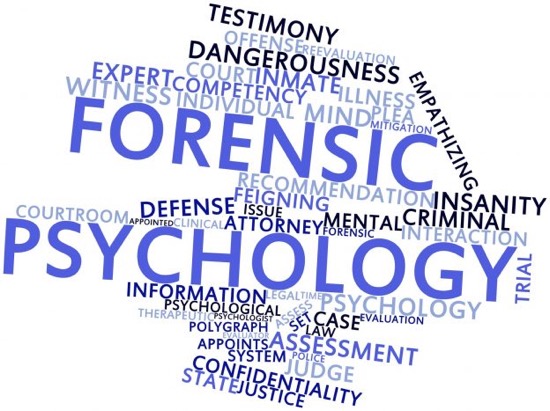Forensic Psychology
Forensic Psychologists Help Criminal Justice Processionals
Investigative psychologists (IPs) can bring a variety of objective psychological techniques to help defence and prosecution lawyers with the assessment and improvement of investigative information.
Investigative Psychologist’s Areas expertise
Investigative psychologist can assist the criminal defence and prosecution by:

Offender profiling:
An objective examination of the styles and patterns of criminal action to infer offender’s psychological and social characteristics. It is important to distinguish the approach used by investigative psychologists from the more subjective approaches profiling approaches used by the FBI.
Geographical profiling:
Assessment of where is the offender probably lives by analysing the geographical pattern of offences.
Linking cases (comparative case analysis):
Application of statistical techniques to link offence styles to crimes that are likely to have been committed by the same offender. Examining the salience of the action to distinguish one offender from another (Canter and Youngs, 2003, p.324). Multi-dimensional scaling and the Narrative Action System Model can help differentiating criminals' styles of offending, allowing empirically-based 'modus operandi' to be identified within a broad range of offence types (Canter & Youngs, 2009, p.163). Profiling equations provide the scientific basis for inferring associations between the actions that occur during the offence, the characteristics of the offender, including the offender's criminal history, background, base location, and relationships with others (Canter & Youngs, 2016).
Network analysis:
Network analysis to understand the development and relationships within terrorist and criminal networks.
Prediction:
Prediction of when and where the offender will strike again and whether the severity of offences is likely to increase.
Decision support (investigative support action plans):
Advising on how the investigative decision-making process can be improved by improving social and psychological processes. And for criminal defence lawyers, critiquing where the decision support is flawed.
Salience:
Advising on which aspects of the crime to focus on to identify the type of individual who might have committed the offence (Canter & Youngs, 2003, p.323).
Evaluation of information:
Advising what information should be assessed as well as the harnessing of information from other public and private sources to understand the cognitive and social processes involved. Determining which sources of information, such as data bases, informants, police records or information from the general public is likely to identify the offender.
Suspect Prioritisation:
By mapping each suspect’s personal characteristics and behavioural patterns to an analysis of the crime.
Statement Validation:
Objective evaluation the evidence including false allegations, false confessions, eyewitness testimony, detecting deception. Evaluation of other aspects of the validity and reliability of information by systematic scrutiny and improvement, particularly by drawing on psychometric tools.
Interviewing Strategies:
Advising on the most effective approach to interviewing suspects (including those with learning disabilities), witnesses and victims using techniques such as the cognitive interview to improve recall (Canter & Youngs 2009, p.217 – 220).
Case Preparation:
By identifying making sense of a case and advising on how to present it in court. Empirically based psychological theories can be used to structure legal cases and improve the quality of arguments.
Investigative Psycholinguistics:
Making inferences from what people have written or said.
Psychological Autopsy:
Making an evaluation of the type of person the deceased was from an interview with others.
Using Forensic Psychology Research Findings:
Using forensic psychology to studies to resolve the issues in dispute and to provide a framework for the processes that police and defence solicitors must go through to solve the crime.
Forensic Psychology and Investigative Psychology and the Courts - Conclusion
While many may argue that the crimes can be solved by courts using experience alone the literature (e.g., Canter & Youngs 2009) confirms that investigative psychologists can offer more effective methods of crime detection than traditional police investigative techniques. The objectively that IP brings results in faster detection of criminals; and the acquittal of those who are innocent; better evidence and more robust cases than can be achieved by traditional criminal defence and prosecution methods alone.
